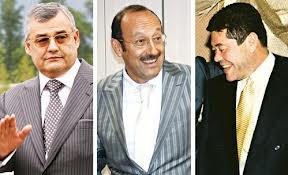 The most surprising thing about the founding trio of Eurasian Natural Resources Corporation – which controls some of Kazakhstan's most important assets – is that none is a native Kazakh.
The most surprising thing about the founding trio of Eurasian Natural Resources Corporation – which controls some of Kazakhstan's most important assets – is that none is a native Kazakh.
Alexander Mashkevich and Alijan Ibragimov, both 59, were born in the neighbouring Soviet central Asian republic of Kyrgyzstan – and once said they first met at a wedding there in 1971. Patokh Chodiev, 60, was born in Tashkent, capital of neighbouring Uzbekistan.
But all three, each estimated by Forbes to be worth $2.1bn, are part of the Kazakh establishment, and seen as close to the country's authoritarian president, Nursultan Nazarbayev.
Kazakhstan's small opposition has claimed the three helped finance Mr Nazarbayev's election campaigns, and has repeatedly called for a review of the opaque 1990's privatisations in which they and other Kazakh tycoons made their fortunes.
The trio have also been surrounded by controversy elsewhere. For a decade and a half, they faced an investigation in Belgium – where Mr Chodiev has citizenship – into alleged money-laundering relating to a property purchase, which they denied. Some suggest the probe was stoked by a business rival in the 1990s.
The case – one reason why the three did not take board seats when ENRC listed in London in 2007 – was settled in 2011 by paying a fine without any admission of wrongdoing.
Mr Chodiev studied at MGIMO, the elite Moscow state institute of international affairs that was often a fast track to a foreign service or intelligence career, and then became a Soviet trade official, partly in Japan. That career path led to rumours that Mr Chodiev had KGB links – which he has denied.
A friend and classmate at MGIMO, as Mr Chodiev told the institute's in-house magazine in a rare interview years later, was a fellow Uzbek: Alisher Usmanov, now Russia's richest man, worth $18bn.
Mr Mashkevich started out as an academic, becoming dean of Kyrgyz State University; Mr Ibragimov worked in Kyrgyz industrial plants. But the trio came together in perestroika-era Moscow in the late 1980s. Like many ex-Soviet tycoons, they started in business by trading in Soviet-produced oil and commodities, and importing sought-after western PCs.
By 1991, Mr Chodiev told the college magazine, "each of us had $100m". While future Russian oligarchs turned their millions into billions by buying assets cheaply in Russia's 1990s privatisations, however, the trio turned to Kazakhstan, whose economy was then in even worse post-communist turmoil than Russia's.
Mr Chodiev said a friend introduced him in 1994 to the Kazakh prime minister, who invited him to invest. "I joked that I needed a guarantee from [president] Nazarbayev himself," he said. Shortly after, he met the president on a Moscow visit, and secured a contract to manage Kazakhstan's Pavlodar aluminium plant.
By insisting the plant's customers paid cash, and refusing to engage in barter deals that had become commonplace as hyperinflation raged, they turned the plant's fortunes round, paying off year-long wage arrears to employees. When the state auctioned off the business a few months later, the trio won control.
After Trans-World was hit with unpaid tax charges by the Kazakh authorities in 1997, which it always denied, the partnership broke down and dissolved into legal disputes, finally settled in 2000.Around this time they teamed up with Trans-World Group, the UK-based metals trader run by brothers David and Simon Reuben, to acquire other Kazakh assets being privatised. They included the Sokolovsko-Sarbaiskoye iron ore mine, Kazchrome, a ferroalloy producer, and other mining assets, which are still the core of ENRC today.
By then, with the Kazakh economy starting to boom, the group began expanding beyond Kazakhstan. It hired Johannes Sittard, who previously worked for Indian steel magnate Lakshmi Mittal, who took the group into the nickel industry in the Balkans, and the cobalt industry in Zambia. He also prepared ENRC for its 2007 London flotation.
After a subsequent five-year acquisition spree of often questionable assets that left the group with heavy debt, however, the wheel may be about to come full circle with the trio seeking financing to buy out minority shareholders and retake full control.
"They want to stop the haemorrhaging," said one expert on Central Asian business. "They want it back in their own hands."
www.ft.com




